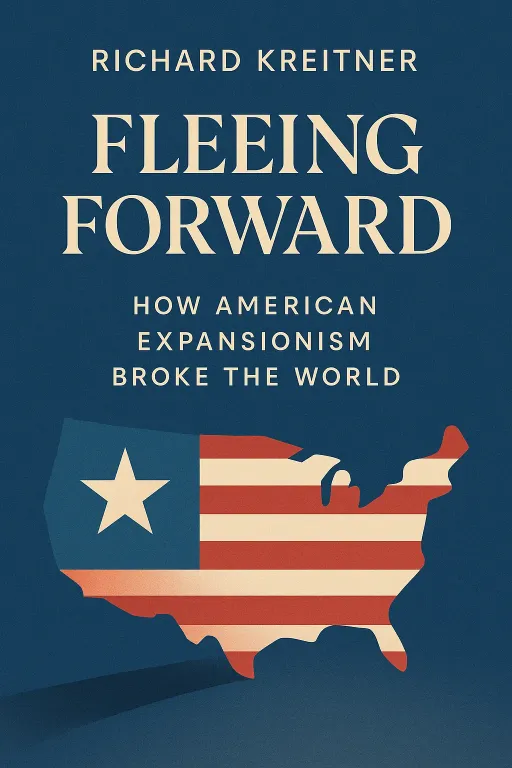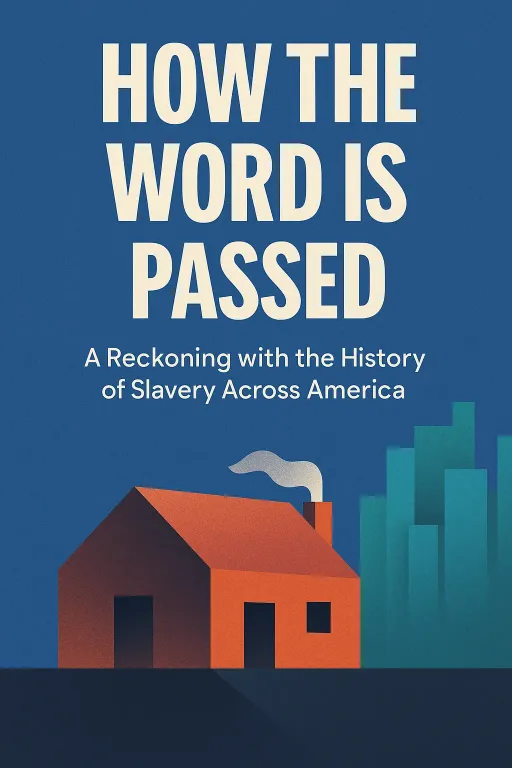
Fleeing Forward
10 minHow American Expansionism Broke the World
Introduction
Narrator: Imagine a nation built on a profound and powerful myth: the idea of a limitless frontier. A place of endless space, boundless opportunity, and constant forward motion. For centuries, this myth wasn't just a story; it was the engine of American identity, a safety valve that allowed the country to push its internal conflicts—its deepest sins of racism, inequality, and division—ever outward. By constantly expanding, the nation could avoid looking inward. But what happens when the frontier closes? What happens when there is nowhere left to run?
In his book, Fleeing Forward: How American Expansionism Broke the World, author Richard Kreitner argues that this moment has arrived. The energy that once fueled westward expansion and global ambition has turned inward, tearing the country apart. The book presents a provocative reinterpretation of American history, suggesting that the nation's perpetual drive outward was never about progress, but about escape.
The Frontier Was America's Foundational Myth and Safety Valve
Key Insight 1
Narrator: The core of America's self-perception was forged in 1893 by a historian named Frederick Jackson Turner. In what became known as the Frontier Thesis, Turner argued that the experience of westward expansion—the continuous movement into "free land"—created a uniquely American character defined by rugged individualism, democracy, and relentless optimism. This idea became a national liturgy, a story America told itself about its own exceptionalism.
However, Kreitner reveals a darker function of this myth. The frontier acted as a "safety valve," a concept borrowed from the steam engines of the industrial age. Whenever social pressures like class conflict, racial tension, or economic anxiety built to a breaking point, the promise of the West offered an escape. Instead of confronting the injustices of slavery or the brutal conditions of factory work, the nation could point to the horizon and promise a new start. This outward push became a way to deflect and defer a reckoning with the country's internal contradictions. As long as there was more land to conquer and more space to fill, America could avoid dealing with the problems it was creating at home.
Expansion Was Achieved Through Unrelenting Violence and Racial Subjugation
Key Insight 2
Narrator: The romantic myth of the frontier conveniently erased the brutal reality of its creation. Kreitner argues that American expansion was not a peaceful settlement but a relentless campaign of violence, dispossession, and racial terror. The Age of Jackson, often celebrated as an era of the "common man," was in fact a period of radical empowerment for white men, built directly on the subjugation of others.
This is starkly illustrated by the story of Andrew Jackson himself. Long before he became president, Jackson was a military leader in Tennessee who embodied the settler spirit. He saw Native American nations not as sovereign peoples but as obstacles to be removed. During the Creek War, he instructed his men to become "engines of destruction," and they laid waste to Creek villages, mutilating bodies and enslaving women and children. After the slaughter, he forced a treaty on the defeated Creeks that stripped them of over twenty million acres. This wasn't an isolated incident; it was the model for a national policy of Indian Removal that Jackson would later champion from the White House. This history shows that the "freedom" of the frontier was a freedom for some, purchased through the violent oppression of others.
The End of the Civil War Was a Missed Opportunity to Break the Cycle
Key Insight 3
Narrator: The period after the Civil War, known as Reconstruction, offered a fleeting chance for America to break from its expansionist past and build a truly multiracial democracy. The most powerful symbol of this potential was the Freedmen's Bureau, an unprecedented federal agency established in 1865. As described by W. E. B. Du Bois, it was "the most extraordinary and far-reaching institution of social uplift that America has ever attempted." The Bureau provided food, medicine, and legal support to millions of formerly enslaved people and poor whites, and it established thousands of schools and hospitals.
But this vision of a more socially responsible government was quickly dismantled. President Andrew Johnson, a staunch Jacksonian, used racist rhetoric to attack the Bureau, vetoing its extension by claiming it was a giveaway to Black people at the expense of whites. The nation, exhausted by war, turned away from the difficult work of Reconstruction. Instead, it turned back to its old habit: the frontier. This pivot is perfectly symbolized by the fate of the Freedmen's Bureau's leader, General Oliver Otis Howard. In 1872, he was reassigned from his post protecting the rights of freedmen to the West, where he was tasked with forcing the Nez Perce tribe off their land. The nation chose expansion over justice, recommitting to the frontier myth as a way to avoid the bloody obligations of its own history.
The Frontier Myth Went Global, Fueling War and Empire
Key Insight 4
Narrator: As the physical frontier in America closed, the expansionist impulse did not die; it simply found new outlets. The frontier became a global concept, used to justify overseas wars and economic domination. The Vietnam War, Kreitner argues, was the tragic culmination of this thinking. American leaders framed the conflict in familiar frontier terms, with soldiers fighting in "Indian country" and military operations named after figures like "Daniel Boone" and "Crazy Horse."
Martin Luther King Jr. saw through this myth. In his powerful 1967 "Beyond Vietnam" speech, he called the war a "demonic, destructive suction tube" that was pulling money, resources, and moral focus away from the fight for justice at home. He argued that the "bombs in Vietnam explode at home," fueling racism and derailing the War on Poverty. King understood that America's addiction to expansion and militarism was a deep-seated pathology. He directly challenged the idea that social progress could be achieved through war, arguing instead that it activated the nation's worst reactionary and racist impulses, ultimately threatening the very soul of the country.
The Wall Represents the Terrifying End of the Frontier Myth
Key Insight 5
Narrator: In the late 20th century, the consequences of America's expansionist policies came home to roost at the U.S.-Mexico border. Policies like NAFTA, sold with the promise of a borderless new frontier of economic prosperity, had the opposite effect. The treaty devastated Mexican agriculture, displacing millions of farmers who then sought work in the north. In response, the U.S. didn't create a new safety valve; it built a fortress.
The militarization of the border in the 1990s marked a profound shift. The nation that once defined itself by its open horizon now defined itself by a closed gate. This is the world Donald Trump inherited and amplified. His promise to "Build the Wall" is more than a policy proposal; it is the ultimate symbol of the frontier's end. The wall signifies a nation that has run out of room to expand and is now turning its anxieties inward. The violence and racism that were once projected outward onto the frontier have now been concentrated at the border and unleashed on migrants and refugees. The wall represents a nation that still equates freedom with a lack of restraint, but, as Kreitner chillingly concludes, no longer pretends that this freedom can be for everyone.
Conclusion
Narrator: The single most important takeaway from Fleeing Forward is that America's history of expansion was a grand, centuries-long act of avoidance. The frontier was not a source of democratic virtue but a mechanism for deflecting the nation's deepest internal conflicts, particularly its foundational racism and inequality. Now, with the frontier myth exhausted and the physical borders hardened, the nation is forced to confront the demons it has been fleeing from all along.
The book leaves us with a stark and unsettling question. For generations, the promise of endless growth allowed America to avoid a fundamental choice. But now, as the epilogue suggests, that choice can no longer be deferred. Will the nation descend into the barbarism of nativism and exclusion, symbolized by the wall? Or can it finally build a true social democracy, one that confronts its past and provides for all its people? The answer will define the future of the American experiment.









